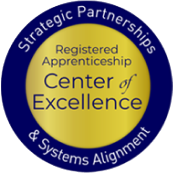Apprenticeship is a high-value tool that local workforce boards can utilize to engage employers, serve job seekers, and meet critical WIOA performance metrics.

| Body | Resource Date | Resource Link |
|---|---|---|
In this Peer-to-Peer Learning, half-day webinar series, attendees heard directly from state leaders who have done work to improve alignment between the Workforce Innovation and Opportunity Act (WIOA) and RA. Attendees gained insight on promising practices to develop or modify state and local WIOA plans, programs, policies, and processes to increase the use of RA in supporting local employers and as a training strategy primarily for WIOA Title I Adult, Dislocated Worker, and Youth participants. The information that was shared in these sessions is helpful to state workforce and RA system leaders and staff, local workforce development board representatives and staff, American Job Center Operators, and workforce system stakeholders, including representatives from WIOA core and partner programs. The half-day webinar session included three, 30-minute presentations from select states that are moving the needle on system alignment, and a 60-minute facilitated breakout session where webinar attendees discussed challenges and explore solutions to increasing WIOA/RA system alignment. Link to September 25th Webinar |
||
This two-page guide outlines how employers can benefit by collaborating with Local Workforce Development Boards (LWDBs) to establish or expand Registered Apprenticeship (RA) programs. It highlights several employer challenges such as sourcing qualified talent, accessing training providers, covering Related Instruction (RI) costs, and navigating labor market data, and shows how LWDBs can help address each. Key resources include candidate screening and recruitment, pre-apprenticeship training, leveraging WIOA-approved education/training providers, funding support, and connecting to community partners. This guide is designed to help employers understand the tangible advantages of such partnerships and how they make apprenticeship programs more effective, affordable, and sustainable. |
https://dolcoe.safalapps.com/sites/default/files/2025-09/Value%20of%20Employers… | |
Center partner, the National Association of Workforce Development Professionals (NAWDP) hosted the 2025 Business Services Academy. This year, NAWDP collaborated with host sponsors Colorado Department of Labor and Employment (CDLE) and Rocky Mountain Workforce Development Association (RMWDA) to offer a unique academy to workforce professionals. During this event the Center hosted the workshop, Data Meets Service: Revolutionizing Business Service Connections. Workshop attendees participated in interactive discussions on how Registered Apprenticeship programs can successfully align with business services strategy. Dun & Bradstreet Senior Account Director, Bill Greene, co-presented this workshop and provided a unique focus on data sets for an enhanced customer service delivery model. |
https://dolcoe.safalapps.com/sites/default/files/2025-09/Data%20Meets%20Service… | |
The Maryland Workforce Association’s Raising the Bar's annual conference is an opportunity for workforce practitioners and educational professionals to come together and discuss innovative solutions for workforce customers such as job seekers, youth, and businesses. At the conference the Center presented, Connecting Workforce and Registered Apprenticeship in Light of the RAISE Act. During this interactive session, Center Subject Matter Expert, Alan Dodkowitz, offered an overview of the recently passed RAISE Act and discussed its implications for Maryland’s public workforce infrastructure. Attendees discovered how to leverage RAISE act provisions to successfully secure funding, scale effective models and strengthen partnerships between employers and education providers. By the conclusion of the session, workshop attendees had a clear understanding of how local strategies can support state and federal priorities, while ensuring that Maryland positions itself as a national leader in the world of Registered Apprenticeship. |
https://dolcoe.safalapps.com/sites/default/files/2025-09/508%20FINAL%20Raising%… | |
Center partner, the California Workforce Association (CWA), hosted Meeting of the Minds, an annual conference in California that is the state’s foremost workforce development event, hosting hundreds of workforce, education, and community leaders throughout the state. The 2025 theme, Fearless Forward: Turning Uncertainty into Opportunity, speaks to the mindset that workforce practitioners are encouraged to embrace as we navigate the rapidly evolving workforce landscape. The Center of Excellence presented, From Insight to Impact: Peer-Informed Tools to Expand Registered Apprenticeship, showcasing the Registered Apprenticeship (RA) alignment work we have partnered with CWA on over the past few years. This engaging session unpacked challenges that workforce boards, educational institutions, and other workforce partners have experienced in expanding RA and explored innovative strategies for scalable solutions for California. |
https://dolcoe.safalapps.com/sites/default/files/2025-09/CWA%20MMM%202025_PUBLI… | |
The Center of Excellence attended the 2025 Florida Workforce Professional Development Summit themed, Building Brighter Futures: Florida’s Workforce Revolution. The event featured a wide range of workshops designed to support workforce practitioners at all levels within their individual organizations. The Center of Excellence and CareerSource Suncoast co-presented the workshop, A Journey to Success: Registered Apprenticeship and Workforce Development Alignment. Workshop attendees had the opportunity to explore historical foundations, modern-day significance, and practical, sustainable applications of the Registered Apprenticeship (RA) model. The Center of Excellence offered an overview of the Center’s work and discussed key components for aligning and integrating RA programs into local workforce development systems. |
||
This resource equips American Job Center (AJC) case managers with clear tools, strategies, and resources to help veterans transition successfully into Registered Apprenticeship (RA) programs. It covers everything from intake and priority-of-service under WIOA, military skills assessment, and collaborating with Veteran-specific programs, to understanding how to verify VA-approved RA providers and ensure veterans receive all eligible benefits such as the GI Bill’s housing allowance. Case managers will find actionable steps to strengthen employer partnerships, guide veterans in developing career plans, and improve employment outcomes through Registered Apprenticeship pathways. |
https://dolcoe.safalapps.com/sites/default/files/2025-09/Bridging%20the%20Gap%2… | |
This resource outlines and describes the key components of workforce system alignment with Registered Apprenticeship (RA). The document highlights six strategies for strengthening system alignment: adopting supportive policies that prioritize apprenticeship and streamline funding; embedding RA experts in American Job Centers to guide staff and job seekers; training Business Services Representatives to promote programs and engage employers; aligning data systems to improve sharing and policymaking; convening employers, educators, and partners to drive sector-based expansion; and, in some cases, having workforce boards or agencies directly sponsor apprenticeship programs to accelerate adoption and create more career pathways. |
https://dolcoe.safalapps.com/sites/default/files/2025-09/DOL%20RA%20TA%20COE%20… | |
The Center produced this report to showcase how states are strategically aligning Career and Technical Education (CTE) with Registered Apprenticeship (RA). The report highlights trends such as funding initiatives, employer incentives, credential alignment, and data systems to strengthen talent pipelines and bridge education-to-employment gaps. By spotlighting innovative state policies and actionable examples, like tax credits and wraparound supports to stackable credential pathways, this resource equips apprenticeship stakeholders with practical models to scale robust, education-workforce aligned apprenticeship programs |
https://dolcoe.safalapps.com/sites/default/files/2025-09/CTE%20RA%20Policy%20Re… | |
Recognizing the importance of strategic rollout and adoption of National Guideline Standards (NGS), this tip sheet provides guidance on how to transition from approval to implementation. It offers practical steps for raising awareness, connecting with key stakeholders, and supporting partners in registering new Registered Apprenticeship (RA) programs using NGS. The tip sheet outlines best practices for marketing, partner engagement, and sustained support to increase the utilization of NGS as a scalable workforce development tool. |
https://dolcoe.safalapps.com/sites/default/files/2025-09/What%27s%20Next%20for%… |
